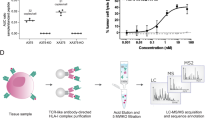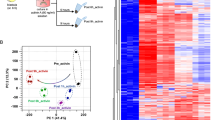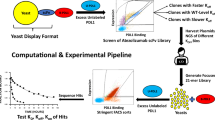Abstract
IN the course of studies on various anti-enzymes, an attempt was made to prepare an anti-tyrosine decarboxylase. The enzyme was an extract from acetone-dried cells of Streptococcus fœcalis, prepared and tested by the method of Epps1. This extract was injected intravenously into a rabbit at three- to four-day intervals, and antiserum removed seven days (approximately) after the third and subsequent injections. On incubation with the crude enzyme preparation, the antiserum regularly gave a precipitate; but, on removal of this precipitate, enzymic activity was retained or slightly increased. The enzyme had, therefore, neither been precipitated nor inactivated in the supernatant. Precipitates were not obtained when the antiserum was replaced by a non-specific rabbit serum.
This is a preview of subscription content, access via your institution
Access options
Subscribe to this journal
Receive 51 print issues and online access
$199.00 per year
only $3.90 per issue
Buy this article
- Purchase on SpringerLink
- Instant access to the full article PDF.
USD 39.95
Prices may be subject to local taxes which are calculated during checkout
Similar content being viewed by others
References
Epps, H. M. R., Biochem. J., 38, 242 (1944).
Author information
Authors and Affiliations
Rights and permissions
About this article
Cite this article
HAPPOLD, F., RYDEN, R. Attempt to prepare Anti-Tyrosine Decarboxylase. Nature 169, 115 (1952). https://doi.org/10.1038/169115a0
Issue date:
DOI: https://doi.org/10.1038/169115a0



